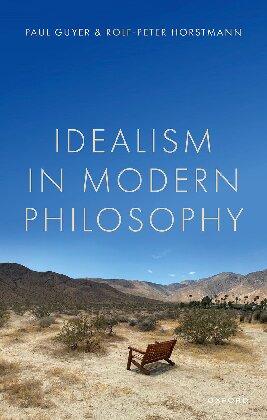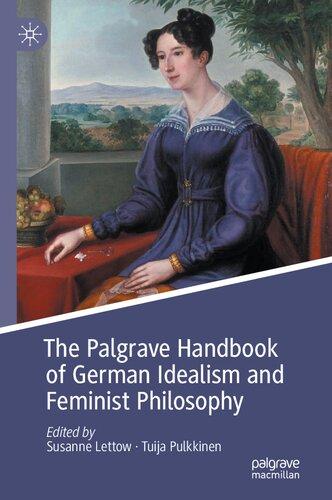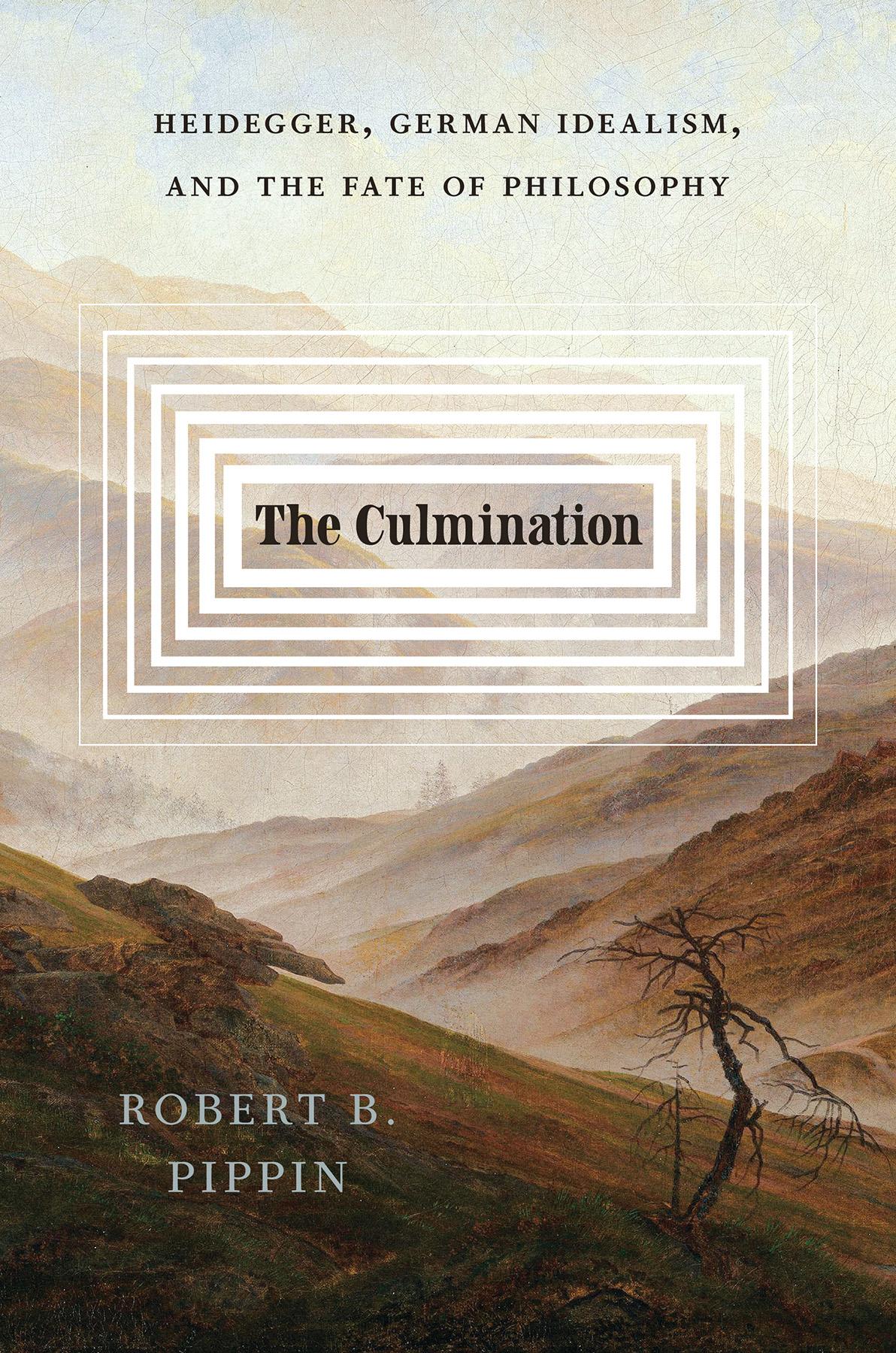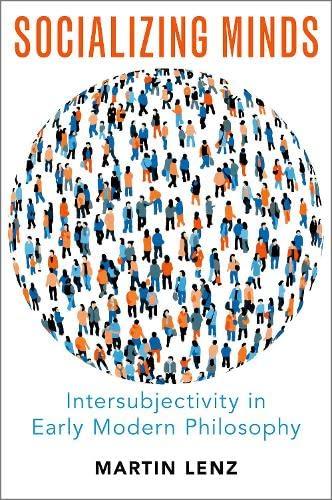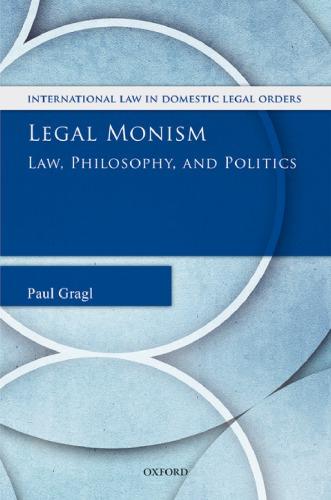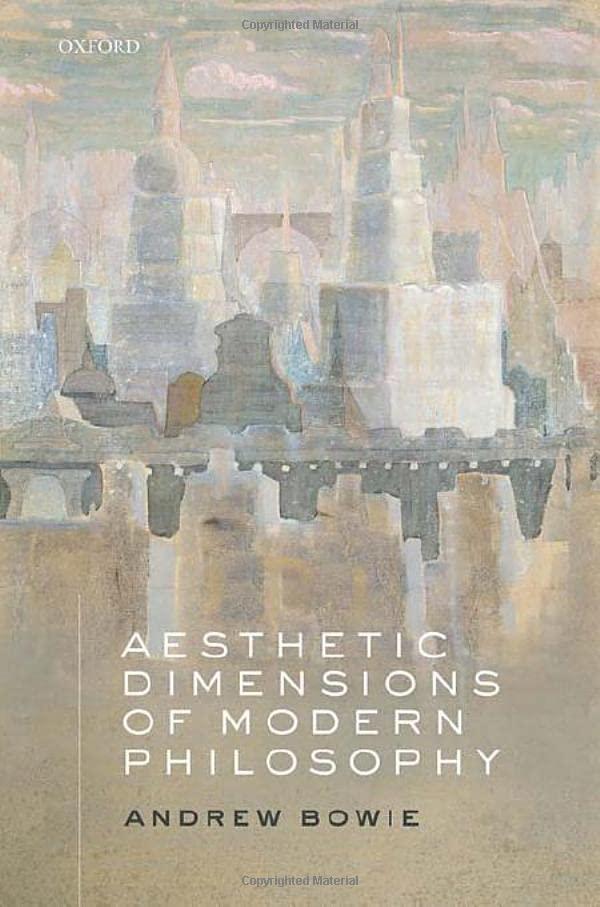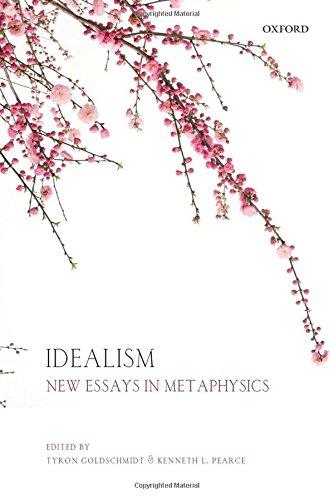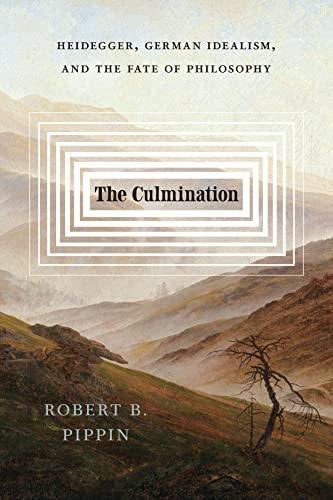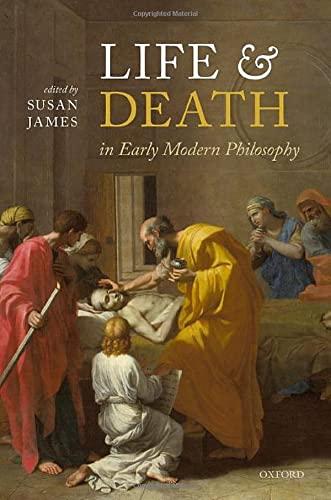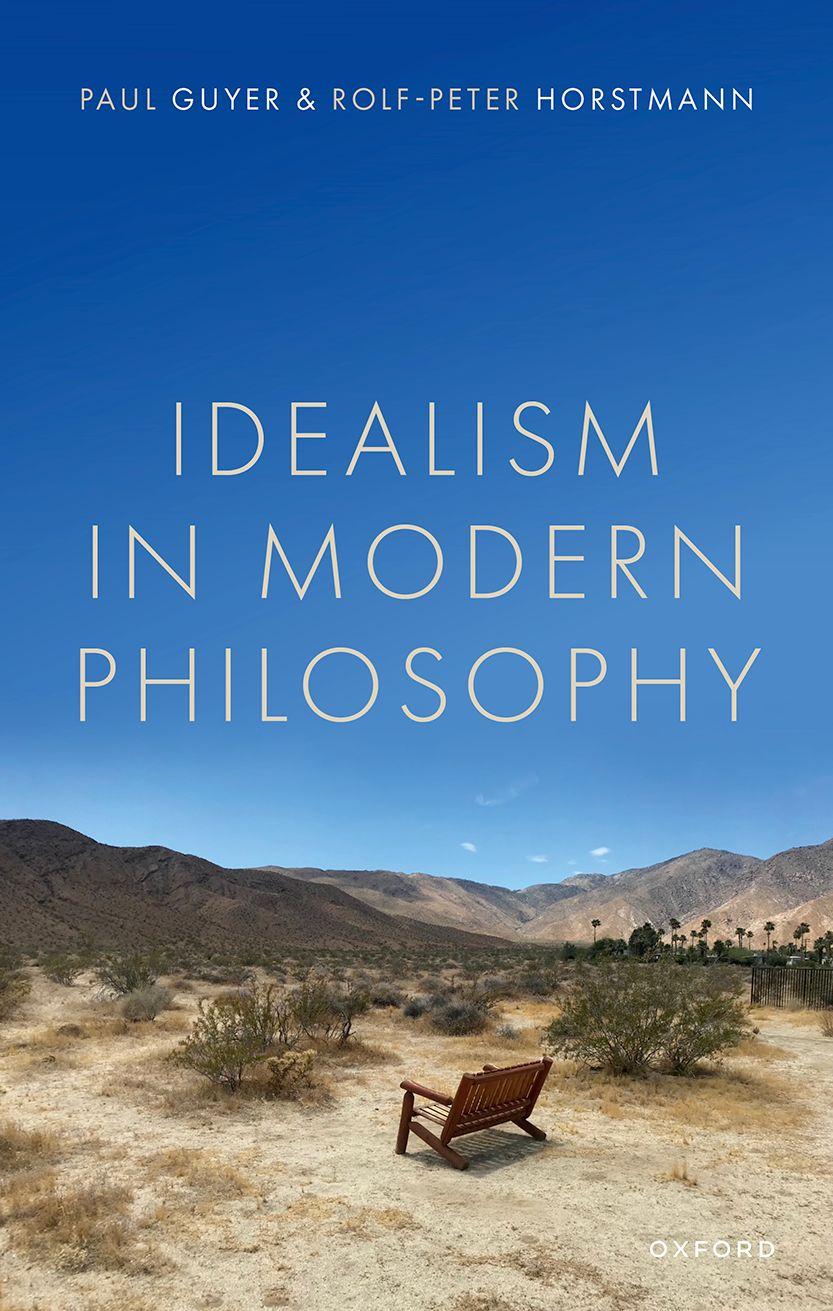IdealisminModern Philosophy
PAULGUYER AND ROLF-PETERHORSTMANN
GreatClarendonStreet,Oxford,OX26DP, UnitedKingdom
OxfordUniversityPressisadepartmentoftheUniversityofOxford. ItfurtherstheUniversity’sobjectiveofexcellenceinresearch,scholarship, andeducationbypublishingworldwide.Oxfordisaregisteredtrademarkof OxfordUniversityPressintheUKandincertainothercountries
©PaulGuyerandRolf-PeterHorstmann2023
Themoralrightsoftheauthorshavebeenasserted FirstEditionpublishedin2023
Impression:1
Allrightsreserved.Nopartofthispublicationmaybereproduced,storedin aretrievalsystem,ortransmitted,inanyformorbyanymeans,withoutthe priorpermissioninwritingofOxfordUniversityPress,orasexpresslypermitted bylaw,bylicenceorundertermsagreedwiththeappropriatereprographics rightsorganization.Enquiriesconcerningreproductionoutsidethescopeofthe aboveshouldbesenttotheRightsDepartment,OxfordUniversityPress,atthe addressabove
Youmustnotcirculatethisworkinanyotherform andyoumustimposethissameconditiononanyacquirer
PublishedintheUnitedStatesofAmericabyOxfordUniversityPress 198MadisonAvenue,NewYork,NY10016,UnitedStatesofAmerica
BritishLibraryCataloguinginPublicationData Dataavailable
LibraryofCongressControlNumber:2022945794
ISBN978–0–19–284857–4(hbk.)
ISBN978–0–19–284858–1(pbk.)
DOI:10.1093/oso/9780192848574.001.0001
Printedandboundby CPIGroup(UK)Ltd,Croydon,CR04YY
LinkstothirdpartywebsitesareprovidedbyOxfordingoodfaithand forinformationonly.Oxforddisclaimsanyresponsibilityforthematerials containedinanythirdpartywebsitereferencedinthiswork.
9.TheGermanResponsetoIdealismII:Neo-Kantianism
Preface
Weofferhereanintroductiontoidealisminmodernphilosophy.Wefocus onidealisminepistemologyandmetaphysics,largelyexcludingidealismin moralandpoliticalphilosophyandidealismasabroadersocialmovement, andwefocusonphilosophicalconcepts,theses,andargumentsforand againstthemratherthanspeculatingonhistoricalcausesforthedevelopment,acceptance,orrejectionofsuchphilosophicalcontent.Inotherwords, thisisaworkinthehistoryofphilosophy,notintellectualhistory.Wedo talkaboutmotivesforidealism,however,butwhatwemeanbythatischiefly arguments;thatis,ourtopicisbothfull-blownandself-identifiedidealism inmodernphilosophy,meaningbythatphilosophicalviewsaccordingto whichrealityisultimatelymentalinsomeformorother,butalso approachesandargumentscharacteristicofidealism,particularlyinepistemology,thathavebeenadoptedandacceptedbyphilosophersandphilosophiesthatdonotidentifythemselvesasidealistbecausetheyarenot committedtothereductionofrealitytothemental,ortoidealismas metaphysics.Unlikesomepreviouswriters,wedonotdistinguishepistemologicalandmetaphysicalidealismastwospeciesofidealism,butwedo distinguishepistemologicalandmetaphysicalargumentsforidealism,and arguethattheformerhavebeenmuchmorewidelyappropriatedand acceptedinmodernphilosophy,includingtheso-calledanalyticphilosophy ofthetwentiethcentury,eventhoughthatoriginatedinsomegoodpart asacritiqueofavowedidealisminlatenineteenth-centuryBritain,thanis oftenrecognized.
Thisbookisasignificantrevisionandexpansionofourentryon “Idealism” inthe StanfordEncyclopediaofPhilosophy. Inthatencyclopedia article,weperforceeschewedextensivereferencetoanddebatewithsecondaryliteratureontheprimarysourcesthatwediscussed.Inthepresent work,withthecontinuedaimofprovidinganaccessibleintroductiontothe topicofidealism,welikewiseeschewexplicitdebatewithothercommentators,butwehaveaddedreferencestoliteraturethatwethinkwillhelp readersdigmoredeeplyintothematerialthatwediscussandleadthem furtherintotheextensiveliteratureonthephilosophersandtopicsthatwe discuss.Wehaveprovidedthesereferenceswithparenthesesinthetext
ratherthaninfoot-orendnotes,usingtheauthor-datemethodofcitation. Thereferencestotheworkscitedaswellastootherusefulworkswillbe foundinthebibliography,whichisdividedintotwosectionscovering primaryandsecondarysourcesrespectively.
Sinceourworkoriginallyappearedinthe StanfordEncyclopedia,our first debtofgratitudeisnaturallytotheeditorsofthatwork,ledbyEdZalta,both fortheoriginalinvitationtoproducetheentryandforpermissiontoreuse thematerialfromourentry.The StanfordEncyclopedia,anon-pro fitenterprise,hasdoneaprofoundserviceforbothprofessionalphilosophersanda widerreadershipofstudentsandinterestedreadersforseveraldecadesnow, andhasalwayshadagenerouspolicyallowingauthorstopublishtheir materialinotherformatsaswell.WeworkedonthisentryfollowingGuyer’ s appointmentatBrownUniversityin2012,developingourapproachinseveral seminarsthatwetaughtjointlyatBrownmadepossiblebyHorstmann’ s repeatedappointmentsasaVisitingProfessoratBrown.Wearegratefulto theHumanitiesInitiativeatBrown,toKevinMcLaughlin,DeanofFacultyat Brownduringthisperiod,andtotheBrownDepartmentofPhilosophyfor theirenthusiasticandgeneroussupportofthesevisits.Wehopethatthisbook repaysthisgenerosityatleasttosomedegree.Wearealsogratefultoseveral colleagueswhoparticipatedintheseseminarsorotherwisediscussedthis workwithus,especiallyJustinBroackesandCharlesLarmore,andtothe Brownstudentswhoparticipatedintheseminars.
WewouldalsoliketothankjointlythelateMargaretDaulerWilson,who broughtustogetherasparticipantsintheNationalEndowmentforthe HumanitiesSummerInstituteinEarlyModernPhilosophythatshedirected in1974;thatwasthebeginningofwhatwehopehasproventobeafruitful professionalrelationshipandwhatweknowhasbeenatreasuredfriendship ofnearly fiftyyears.AndwewouldliketothankseverallyDieterHenrich, whowasHorstmann’steacherfromthebeginningofhisuniversitystudies inBerlintothecompletionofhisdoctoralworkinHeidelberg,andwho broughtGuyer’sstudiesinKanttoanewlevelwhenhemadehis firstvisitto Harvardinthespringof1973,Guyer’slastsemesteringraduateschool.Asa teacher,mentor,andinHorstmann’scaselateracolleagueinMunich,and throughhisvastarrayofpublishedworks,hehasbeenaninspirationfor bothofusasweworkedonthetopicofidealism.
Finally,wearegratefultoSydneyDeverMendenhallforhergenerousand exactingassistancewiththeproofreadingofthisbook.
PaulGuyer(BrownUniversity),Rolf-PeterHorstmann(Humboldt UniversitätBerlin)
Introduction
Theterms “idealism ” and “idealist” arebynomeansusedonlywithin philosophy;theyareusedinmanyeverydaycontextsaswell.Optimists whobelievethat,inthelongrun,goodwillprevailareoftencalled “idealists. ” Thisisnotbecausesuchpeoplearethoughttobedevotedtoa philosophicaldoctrinebutbecauseoftheiroutlookonlifegenerally;indeed, theymayevenbepitied,orperhapsenvied,fordisplayinganaiveworldview andnotbeingphilosophicallycriticalatall.Evenwithinphilosophy,the terms “idealism ” and “idealist” areusedindifferentways,whichoftenmakes theirmeaningdependentonthecontext.However,independentlyofcontext onecandistinguishbetweenadescriptive(orclassi ficatory)useofthese termsandapolemicalone,althoughsometimesthesedifferentusesoccur together.Theirdescriptiveuseisbestdocumentedbypayingattentiontothe largenumberofdifferent “idealisms” thatappearinphilosophicaltextbooks andencyclopedias,rangingfrommetaphysicalidealismthroughepistemologicalandaesthetictomoralorethicalidealism.Withintheseidealismsone can findfurtherdistinctions,suchasthosebetweensubjective,objective,and absoluteidealism,andevenmoreobscurecharacterizationssuchasspeculativeidealismandtranscendentalidealism.Itisalsoremarkablethatthe term “idealism,” atleastwithinphilosophy,isoftenusedinsuchawaythatit getsitsmeaningthroughwhatistakentobeitsopposite:asthemeaningful useoftheterm “outside” dependsonacontrastwithsomethingconsidered tobeinside,sothemeaningoftheterm “idealism ” isoften fixedbywhatis takentobeitsopposite.Thus,anidealistissometimestakentobesomeone whoisnotarealist,notamaterialist,notadogmatist,notanempiricist,and soon.Giventhefactthatmanyalsowanttodistinguishbetweenrealism, materialism,dogmatism,andempiricism,itisobviousthatthinkingofthe meaningof “idealism ” asdeterminedbywhatitismeanttobeopposedto leadstofurthercomplexityandgivesrisetotheimpressionthatunderlying suchcharacterizationsliessomepolemicalor,atleast,criticalintent.
Withinmodernphilosophytherearegenerallytakentobetwofundamental conceptionsofidealism:
1.Somethingmental(themind,spirit,reason,will)istheultimate foundationofallreality,orevenexhaustiveofreality,andeverything consideredtobe “real” mustbetakentobeamanifestationofsomethingmental(eventhementalitself).
2.Althoughtheexistenceofsomethingindependentofthemindis conceded,everythingthatwecan know aboutthismind-independent “reality” isheldtobesopermeatedbythecreative,formative,or constructiveactivitiesofthemind(ofsomekindorother)thatall claimstoknowledgemustbeconsidered,insomesense,tobeaform ofself-knowledge,understoodasknowledgethatisrootedincontributionsbythesubjectofknowledge.
Idealisminsense(1)hasbeencalled “metaphysical” or “ontological idealism,” whileidealisminsense(2)hasbeencalled “formal” or “epistemologicalidealism.” Themodernparadigmofidealisminsense(1)mightbe consideredtobeGeorgeBerkeley’ s “immaterialism, ” accordingtowhichall thatexistsareideasandtheminds,lessthandivineordivine,thathave them.(Berkeleyhimselfdidnotusetheterm “idealism,” whichentered EnglishusagefromGermanonlylater.)Thefountainheadforidealismin sense(2)mightbethepositionthatImmanuelKantasserted(ifnotclearly inthe firsteditionofhis CritiqueofPureReason [1781]theninhis ProlegomenatoAnyFutureMetaphysics [1783]andinthe “Refutationof Idealism” inthesecondeditionofthe Critique)accordingtowhichidealism does “notconcerntheexistenceofthings,” butassertsonlythatour “modes ofrepresentation” ofthem,aboveallspaceandtime,arenot “determinationsthatbelongtothingsinthemselves” butfeaturesofourownminds. Kantcalledhisposition “transcendental” and “critical” idealism,andithas alsobeencalled “formal” idealism.However,Kant’spositioniscomplicated. Hearguesthatspaceand/ortimearethenecessaryformsforourexperience ofallobjectsandevents spaceandtimeinthecaseofexternalobjectsand events,timeonlyinthecaseofinnerstates;thisiswhathecalls “empirical realism.” Ourknowledgeofspaceandtimeinmathematics,particularly geometry,isthefoundationofallordinaryexperienceandnaturalscience. Butinordertomaintainthatwehaveaprioriknowledgeofthisfactandof thepropertiesofspaceandtime,asingeometry,Kantarguesthatspace andtime cannot bepropertiesofthingsastheyareinthemselves,somust befeatures only ofourownrepresentationsofthings thisiswhathe callsthe “transcendentalideality ” ofspaceandtime,leadingtohisdoctrine of “transcendentalidealism.” YetKantneverseesanyreasontodeny
the existence ofthingsastheyareinthemselves,distinctfromour representationsofthem,orthingsinthemselvesforshort,andforthisreason hevigorouslyrejectstheassimilationofhispositiontothatofBerkeley,which heregardsasidealismproper,or “dogmaticidealism.” Kant’spositionisthus anamalgamofidealismandrealism,notastraightforwardversionofidealism atall.Anditcontainsoneimportantlessonforthinkingaboutidealism:aview thatweknowthingsfromourownhumanpointofviewcanbecomeatrivial oranodynetautologythatweknowthingsinthewaythatweknowthem,not aformofidealismatall,unlessitisaccompaniedwithsomereasontobelieve thattheremustbesome difference betweenthewaythatweknoworrepresent thingsandthewaythattheyareinthemselves theviewthatKantheld regardingthe “transcendentalideality” ofspaceandtime.Intheabsenceof suchaclaim,manyphilosophicalpositionsthatmightlooklike “epistemologicalidealism” turnoutnottobeversionsofidealismafterall.
Sowewillnottreatmetaphysicalandepistemologicalidealismastwo formsofidealism.Instead,wedrawadistinctionbetweenmetaphysicaland epistemological arguments foridealism,whereidealismisalwaysunderstoodtobeametaphysicaldoctrine,namelythateverythingthatexistsisin somewaymental.WethusagreewithA.C.Ewing,whowrotein1934that allformsofidealism
haveincommontheviewthattherecanbenophysicalobjectsexisting apartfromsomeexperience,andthismightperhapsbetakenasthe definitionofidealism,providedthatweregardthinkingaspartofexperienceanddonotimplyby “experience” passivity,andprovidedweinclude underexperiencenotonlyhumanexperiencebuttheso-called “Absolute Experience” ortheexperienceofaGodsuchasBerkeleypostulates.
(Ewing1934:3)
Inotherwords,whilereducingallrealitytosomekindofhuman perception,if thatisunderstoodpassively,isoneformofidealism,itisnottheonlyform realitymaybereducedtothementalunderstoodtoinvolveactivityaswellas passivity,orunderstoodtocomprisenon-humanaswellashumanmentality. ThusWillemdeVries’smorerecentdefinitionofidealismasthegeneral theorythatreducesrealitytosomeformorotherofthementalisjust:
Roughly,thegenuscomprisestheoriesthatattributeontologicalpriorityto themental,especiallytheconceptualorideational,overthenon-mental.
(deVries2009:211)
WealsoagreewithJeremyDunham,IainHamiltonGrant,andSeanWatson whentheywritethat
theidealist,ratherthanbeinganti-realist,isinfact...arealistconcerning elementsmoreusuallydismissedfromreality.
(Dunham,Grant,andWatson2011:4)
Theseelementscomprisemindsofsomekindorother.Idealismisunderstoodincontrasttomaterialism;whilethematerialistdeniestherealityof mindasanythingmorethansomepropertyofmatter,theidealistdeniesthe mind-independentrealityofmatter,buthardlydeniestherealityofmind (or,ontheiraccount,whichgoesbacktoPlato,IdeasorFormsaswellas minds;however,wewillnotbeconsideringpre-modernformsofidealismin anydetail).
WewillthusfollowEwing(seehischaptersII,IV–V,andVIII)in distinguishingmetaphysicalfromepistemologicalargumentsforidealism. Metaphysicalargumentsproceedbyidentifyingsomegeneralconstraintson existenceandarguingthatonlymindsofsomesortorothercansatisfysuch conditions;epistemologicalargumentsworkbyidentifyingsomeconditions forknowledgeandarguingthatonlyobjectsthatareinsomesenseorother mentalcansatisfytheconditionsforbeingknown.Inparticular,epistemologicalargumentsforidealismassumethattheremustbea necessary isomorphismbetweenorevenanidentityofknowledgeanditsobjectthat canobtainonlyiftheobjectofknowledgeisitselfmental;weproposethat thisclaimofnecessaryidentitybetweenknowledgeandwhatisknownisthe differencebetweenepistemologicallymotivatedidealismandthemetaphysicallyneutralpositionthatmightbeassociatedwithphilosopherssuchas RudolfCarnap,W.V.O.Quine,andDonaldDavidsonorevenwithKant’ s realismwithregardtothe existence ofthingsinthemselves.Manytwentiethcenturyphilosopherssuchasthosementionedhaveheldthatofcoursewe alwaysknowthingsfromourownpointofview,butconsideranyquestion aboutwhetherornotourpointofview “corresponds” toindependentreality an “external” question,asCarnapputit,whichiseithermeaninglessorisat leastnotanswerableontheoreticalgrounds.Thatis,theymayseenoreason topositivelyaffirmthatrealitymustmatchourwayofrepresentingit,but neitherdotheyadmitanyreasonto deny this theirstanceistoavoid metaphysicsaltogetherpreciselybyomittinganyclaimtonecessaryidentity betweenknowledgeandtheknown.Indeed,thatpremisemightberegarded ascrucialforeitheridealismormaterialistrealismasmetaphysical
doctrines,forTomRockmorehasrecentlyarguedthatmaterialistdoctrines sincethetimeofParmenideshavealsobeenbasedonthepremiseofa necessaryidentitybetweenknowledgeandtheknown(Rockmore2021) thedifferenceisjustthatinthecaseofmaterialism,aviewaboutthenature oftheobjectofknowledgeistransferredtotheconceptionofknowingand theknoweronthebasisofthepresumedidentity,whileinthecaseof idealismtheconceptionofthenatureofknowledgeandtheknoweris transferredtotheconceptionoftheobjectofknowledgeonthebasisof thesamepresumedidentity.
Itisinordertopreservethedistinctionbetweentraditionalidealismand positionssuchasthoseofCarnap,Quine,andDavidson,or “conceptual” and “linguisticidealists ” suchasNicholasRescherandThomasHofweber (Rescher1973;Hofweber2017),allofwhichmightbeconsideredexpressionsofthedefaultpositionintwentieth-centuryphilosophyheldbyallbut “naiverealists” whobelievethatwenecessarilyrepresentrealityexactlyasit is,thatwedefineidealismbytheclaimthatrealityisinsomewayorother fundamentallymentalwhilerecognizingepistemologicalargumentsfor idealismasametaphysicaldoctrineratherthanepistemologicalidealism asadistinctformofidealism.Ofcoursemetaphysicalandepistemological argumentsforidealismcanbecombinedbyasinglephilosopher.As wewillsee,Berkeleydoesso,andsodoesKantinarguingforthetranscendentalidealistpartofhiscomplexposition.Othersseparatethem,for exampleinlatenineteenth-andearlytwentieth-centuryBritishphilosophy F.H.BradleyandJ.McT.E.McTaggartconstructedmetaphysicalargumentsforidealism,whileinthesameperiodtheAmericansJosiahRoyce andBrandBlanshardofferedepistemologicalargumentsforidealism.
Inwhatfollows,wewillconcentratemainlyonthediscussionofphilosophicaltheoriesthateitherendorseorclaimtoendorseidealismonontologicaland/orepistemologicalgrounds.Atsomepointsinitscomplex history,however,aboveallinthesocialaswellasphilosophicalmovement thatdominatedBritishandAmericanuniversitiesinthesecondhalfofthe nineteenthcenturyandthroughWorldWarI,idealismineitherofits philosophicalformswasindeedconnectedtoidealisminthepopularsense ofprogressiveandoptimisticsocialthought.Thiswastruefor figuressuchas BradleyandRoyceandtheirpredecessorsandcontemporariessuchas ThomasHillGreenandBernardBosanquet.TherehasrecentlybeenconsiderableinterestinBritishormoregenerallyanglophoneidealismasa movementinsocialphilosophy,orevenasocialmovement,butthataspect ofmodernidealismwillremainbeyondourpurviewhere,evenifinsome
waysthatmightbeitsmostimportantaspect(seetreatmentsofidealismasa moral,political,andsocialmovement:Mander2011;BoucherandVincent 2012;Mandered.2000;andManderandPanagakoueds.2016).
Ourdistinctionbetweentheviewthatepistemologicalandontological idealismaretwodistinctformsofidealism,whichwereject,andtheview thatthattherearedistinctmetaphysicalandepistemologicalargumentsfor idealism,whichweaccept(whichisnottosaythatwewillbeendorsing theseargumentsthemselves!),hasnotalwaysbeenclearlymade.However, JosiahRoyce,inmanywaystheleadingspokesmanforidealisminthe historyofAmericanphilosophy(seeFlowerandMurphey1977:ch.12; Kuklick1977:chs.8,14–16;Kuklick1985a;Oppenheim2005),pointedin thedirectionofourdistinctionattheendofthenineteenthcentury.On Royce’sdefinitions,epistemologicalidealism
involvesatheoryof thenatureofourhumanknowledge;andvarious decidedlydifferenttheoriesarecalledbythisnameinviewofonecommon feature,namely,thestressthattheylayuponthe “subjectivity” ofalarger orsmallerportionofwhatpretendstobeourknowledgeofthings.
(Royce1892:xii–xiii)
Metaphysicalidealism,hesays, “isatheoryasto thenatureoftherealworld, howeverwemaycometoknowthatnature” (Royce1892:xiii),namelya theory,ashesaysquotingfromanotherphilosopherofthetime,based onthe
beliefinaspiritualprincipleatthebasisoftheworld,withoutthereduction ofthephysicalworldtoamereillusion.
(1892:xiii;quotingFalckenberg1886:476)
Thislookslikeastraightforwarddistinctionbetweenepistemologicaland metaphysicalversionsofidealism.ButRoycethenarguedthatepistemologicalidealismultimatelyentailsafoundationinmetaphysicalidealism,in particularthat “thequestionastohowwe ‘transcend’ the ‘subjective’ inour knowledge,” thatis,thepurelyindividual,althoughitexistsforbothmetaphysicalrealistsandidealists,canonlybeansweredbymetaphysicalidealists (Royce1892:xiv).Wewillarguesimilarlythatwhileepistemologycanentail idealism,ontheassumptionthattheidentityofknowledgeandtheknown mustbeinsomesensenecessaryandthatthiscanbesoonlyiftheknownas wellasknowledgeisinsomesensemental,thisshouldbedistinguishedfrom
themoregeneralandextremelywidespreadviewthatourknowledgeis alwaysformedwithinourownpointofview,conceptualframework,or webofbelief.Thisviewmaywellbe,aswehavesuggested,thedefault positionofmuchtwentieth-centuryphilosophy, “continental” aswellas “analytic, ” butitdoesnotbyitselfentailthatrealityisessentiallymental.
Ourdistinctionbetweenepistemologicalandmetaphysicalargumentsfor idealismcanalsobeassociatedwithamoregeneraldistinctionbetweentwo majorkindsofmotivesforidealism:thosethataregroundedinselfconceptions,thatis,inconvictionsabouttherolethattheselforthe humanbeingplaysintheworld,andthosebasedonwhatmightcorrespondinglybecalledworld-convictions,thatis,onconceptionsaboutthe waytheworldisconstitutedobjectivelyoratleastappearstobeconstituted toahumansubject.Concerningmotivesbasedonself-conceptionsof humanbeings,idealismhasseemedhardtoavoidtomanywhohave takenfreedominoneofitsmanyguises(freedomofchoice,freedomof thewill,freedomasautonomy)tobeanintegralpartofanyadequate conceptionoftheself,becausethebeliefintherealityoffreedomoften goestogetherwithacommitmenttosomeversionofmentalcausation,and itistemptingtothinkthatthebestoratleastthemosteconomicalwayto accountformentalcausationconsistsin “mentalizing” oridealizingallof reality,oratleasttomaintainthatthekindofcausaldeterminismthatseems toconflictwithfreedomisonlyoneofourwaysofrepresentingtheworld. Thisisaformofontologicalargumentforidealism.Motivesforidealism basedonworld-convictionscanbefoundinmanydifferentattitudestoward objectivity.Ifonebelievesinscienceasthebestandonlywaytogetan objective,subject-independentconceptionofreality,onemightstillturnto idealism,becauseoftheconditionssupposedtobenecessaryinorderto makesenseofknowledgeofalawofnatureorofthenormativityoflogical inferenceswithlawsofnature;thiswouldbeanepistemologicalargument foridealism.Thenagain,ifonebelievesinthenon-conventionalrealityof normativefactsonemightalsobedrawntoidealisminordertoaccountfor theirnon-physicalreality Plato’sidealisminthetheoryofForms,which assertstherealityofnon-physicalIdeastoexplainthestatusofnormsand thenreducesallotherrealitytomeresimulacraoftheformer,aforerunner ofalllateridealism,mightbeconsideredtoofferanontologicalmotivation foridealisminitsexplanationoftherealityofnorms.Aninclination towardidealismmightevenarisefromconsiderationspertainingtothe ontologicalstatusofaestheticvalues isbeautyanobjectiveattributeof objects? orfromtheinabilityortheunwillingnesstothinkofthe
constitutionofsocialandculturalphenomenalikesocietyorreligionin termsofphysicaltheory.Inshort:Thereareaboutasmanymotivesand reasonsforendorsingidealismastherearedifferentaspectsofrealitytobe knownorexplained.
Allthisbeingsaid,amajorobstacletoanadequateunderstandingof philosophicaltheoriesleaningtowardanexplicitorimplicitendorsementof idealismistheobscurityoftheveryterm “mental” andassociatedtermssuch as “spiritual,”“mind,” and “spirit” thattraditionallyplaysuchacentralrole inanycharacterizationofidealism.Incommonusagetheterm “mental” doesnotimplyanyspeci ficphilosophicaldoctrine.Thetermordinarily characterizesaclusterofpropertiesandstatesofhumanbeingsandperhaps other “higher” organismsdistinguishedfromotherconstellationsofattributesattachedtothemfallingunderthegeneralrubricofphysicalqualities. Itisnormallysaidofpeoplethatthattheyhavenotjustphysicalqualities andabilitiessuchasshape,resistance,bodilymutability,mobility,andsoon, butthattheyalsohavementalpropertiessuchasthecapacitytothink,to speak,todream,todesire,torequest,andsoon(foratypicallistofmental qualities,seeDescartes1641:MeditationII;foranargumentthathuman beingsmustbeconceivedashavingboth “P” and “M” predicates,thatis, bothphysicalandmentalproperties,seeStrawson1959).Inthelatterusage theterm “mental” maycovereverythingthatcannotbegivenaphysical descriptionorwhereitisatleastdoubtfulwhetheritcanbedescribedin termsofphysicalproperties.Someonewhoisthinking,dreaming,desiring, etc.issaidtobeengagedinmentalactivitieswhilesomeonewhoisrunning, swimming,oreatinganddrinkingisconsideredtobeinvolvedinphysical activities.Butfromthisordinaryadjectivalusageoftheterms “mental” and “physical” itseemstobealongwaytoasubstantialphilosophicaltheory. Commonusagemayassumethatmentalpropertiescannotbedescribedin physicalterms,buttakesnopositionthattheycannot consist inorbe explained byphysicalproperties,asforexampleDescartesdidwhenhe arguedthatmindandbodyaretwodistinctkindsof “substances” (Descartes1641:MeditationsIIandVI).Thephilosophicalimplicationsof theterms “themental” or “themind” aswellastheterms “thephysical” or “matter” arenotobviousfromcommonusage,noraretherelationsbetween them.Traditionalsuggestionsaboutthecharacterofthoserelationsinclude relationsofdependenceorsupervenience,whichimplythatoneisontologicallymorebasicthantheother,ofexpressionormanifestation,which impliesthatoneisepistemologicallymorebasicthantheother,andidentity orsamenessineitherdirection.
Theshiftfromtheeverydayadjectivalapplicationtothephilosophical andsubstantivaluseoftheterms “mental” and “physical” seemstorelyon theideathatinordertobeengagedinactivitiessuchasthinking,dreaming, anddesiringonehastopresupposenotmerelyasubjectforthosepredicates, somethingthatoccupiesthegrammaticalpositionofathinkerordreameror desirer,butasubjectthatisaspecificallymentalentityoramind.Thisis supposedtobesomethingontologicallydifferentfromanitemthatisinthe positiontoparticipateinactivitiessuchrunning,swimming,andeatingand drinking,activitiesthatpresupposephysicalentitiesorbodies.Becauseof thepresumeddifferenceinkindofthepropertiestheyhavetheseentitiesare introducedasindependentofeachotherandaseachrequiringdifferent descriptions.Inthemodernperiodsuchajumpfromtheadjectivaltothe substantivaluseoftheterms “mental” and “physical” canbetracedto Descartes,whosupposedthatthoughtandextension(beingextended,e.g., havingshapeandsize)areessentiallydifferentmodesofbeing,andthatany kindofsubstancecanhaveonlyone “essential” mode,thusthatmindand bodymustbetwoessentiallydifferentkindsofsubstances.Descartes’ s distinctionlongmaintaineditsgriponphilosophy,eventhoughitwas immediatelyrecognizedthathisownattempttoexplaintheobviousfact ofinteractionbetweenmentalandphysicalpropertiesandeventsinthe lifeofanyhumanbeingthroughcommunicationbetweenmindandbodyat thepointofthepinealglanddeepwithinthebrainwasoutlandish,and subsequentattempts,suchasthe “occasionalism” ofNicolasMalebranche (Malebranche1674–5)orthe “pre-establishedharmony” ofGottfried WilhelmLeibniz,ChristianWolff,andAlexanderGottliebBaumgarten (Leibniz1714;Wolff1720;Baumgarten1739),werenotmuchbetter.
OnewayofattemptingtosidesteptheCartesiandilemmaaltogether wasbynotstartingfromthesubstantivaluseoftheterms “mental” and “physical. ” Instead,the “mental” andthe “mind” butalsothe “physical” and “body” areconceivedinnon-substantivalterms,ratheras activities that groundwhatareordinarilyregardedasbothphysicalandmentalphenomena.ThisstrategylednotonlytoanewapproachtothephysicalinKant himself,buttoanewconceptionofidealismamongthephilosophers followingKantinlateeighteenth-andearlynineteenth-centuryGermany. Accordingtothesepost-Kantianidealists,whateverthereishastobe conceivedofasmanifestationsofmentalactivities.Theyunderstandthe basicstructureofrealityasconsistingoftherealizationofmentalactivities indynamicprocesses,activitiesthatsomehowmaterializebothinmental andphysicalobjectsstandingindifferentconstellations.However,sucha
strategycouldbepursuedinananalogouswaywithregardtothe “physical” andthe “body” aswell:Astheactivitiesofthinking,dreaming,anddesiring findtheirexpressionsormanifestationsinthementaldomainintheobjectifiedshapeofthoughts,dreams,anddesires,sotoophysicalforcesand powerscouldbetakentomanifestthemselvesinthephysicaldomaininthe shapeofmaterialobjectsandtheirinteractions.Whilethe “physicalist” mightthenconceiveofmentaleventsandstatesassupervenientonphysical objectsassounderstood,theidealistseesmentalactivitiesasself-standing andself-explanatory.Althoughthemodelforthinkingofthementalalong thelinesofactivities firstandsubstancesonlyafterwardsifatallisa hallmarkofidealisticpositions,inparticularofthepost-KantianGerman idealisticdoctrinesofJohannGottliebFichte,FriedrichWilhelmJoseph Schelling,andGeorgWilhelmFriedrichHegel,theoppositemodelthat conceivesofthephysicalandbodiesintermsofforcesanddynamic processeshasbeenpursuedaswell.TheprocessontologyofAlfredNorth Whitehead(Whitehead1929)isanexampleofthiswayofthinking. Physicaliststoocouldanddidmovefromasubstantival-basedconception ofmatter,suchasEpicureanorearlymodernatomism,toaconceptionof thephysicalworldintermsofactivities;indeed,Kant’sownalternativeto atomisminphysicaltheory,whichreducesphysicalrealitytoattractiveand repulsiveforces,couldbeseenasthegrandfatherofnon-substance-based physicalism.Butremainingwiththecaseofidealism,sincesuchpositions turnonthepreferenceforusingthecategoryofactivityratherthanof substancefortheprimarycharacterizationofreality,theycanalsobe regardedasontologicalargumentsforidealismunderstoodinthemodi fied, activity-basedsense.
Yetevenifweacceptthemovefromtheadjectivaltothesubstantivaluse oftheterm “mental” andagreethatwhatistakentoberealityinitsentirety containsmorethanjustmattersubjecttothelawsofphysics,wemightstill havereservationsthatinadditiontomattertheremustbementalentities. Thisisbecausethevaguenessofthelattertermisnotremovedwhetheritis understoodineitheritssubstantivaloritsactivity-basedsense.Whatdoesit meantobeamentalsubstance?Whatdoesitmeantobethemanifestation ofanactivityorforce?Manypeoplewillfeeluncomfortableidentifyingwith anyversionofidealism.Theymayreasonablybeirritatedbythefactthat althoughidealistsprioritizethementaltheyhavelittletosayaboutits characteristicsexceptthatitisanon-materialelementofreality.
However,thisisnotaproblemonlyforidealisttheories;itisalsoa challengetocompetingmaterialistanddualistpositionsaswelloncethey
trytodistinguishbetweendifferentkindsofphenomenaandattemptto capturethedifferencewiththemental-physicaldistinction.Modernmaterialistswhoallowformentalorpsychologicalphenomenaincontrastto physicalonesandtrytoexplaintheformerbythelatter,eitherbystipulating identity(theAustralianslikeJ.J.C.SmartandDavidArmstrongamong others;seeSmart1963andArmstrong1968)orbyrelyingonsomesortof supervenience(e.g.,Davidson,JaegwonKim,andDavidChalmers;see Davidson2001;Kim1993;Chalmers1996),alsofacethedifficultyof finding asatisfyingdescriptionofwhattheytaketobenon-physicalormentalstates. Thesameistrueofdualistsinallperiodsinthehistoryofphilosophy. Althoughtheproponentsofdualismmightavoidimplausibilitiesconnected withreductionistorsupervenienceviews,theydonotfaremuchbetterwhen itcomestoprovidinganuncontroversialcharacterizationofwhattheyare referringtowhentalkingaboutthemental.
Soitisnowonderthatwhatexactlyismeantby “mental” dependsagreat dealonthegeneralexplanatoryapproachofametaphysicaltheory,thatis, whetheritestablishesitsresultswithinaframeworkthatgivespriorityto substancesoveractivitiesorwithinasettingthatfavorsactivitiesover substances.Thesetwomaintendenciesinmetaphysicaldiscourseabout realityareindependentofallthe-ismsmentionedsofar(idealism,materialism,dualism).The firstwantstoconvinceusthateverythingthatcanbe addressedhastobeaddressedintermsofthingsthathavesomesortof stableexistence,thusthatintheendwheneverwedealwithanythingthat existswearedealingwithsubstantialentitiesorthings.Thesesubstances havetopossessqualitiesorattributes,amongthemmentalpropertieslike thinking,perceiving,imagining,andwillingandphysicaloneslikeextension,solidity,shape,andmotionthatarereducibleornottoeachotherorto somethirditem.Theothertendencystartswiththeconvictionthatwhatis ultimatelyrealareactivitiesordynamicprocesses,paradigmaticallyin idealistcirclestheoperationofthinkinginanyofitsexemplaryformslike perceiving,imagining,andwilling,understoodasactivitiesordynamic processes.Thinkingasactivitysomehowexpressesitselfinwhatforus appearsintheshapeofsubstantialthingswithqualities.Apreferencefor anontologybasedonactivitiesorsubstancesdoesnotimmediatelyleadtoa preferenceforidealismormaterialism,butratherdeterminestheconceptual frameworkwithinwhichthedebatebetweenmaterialismandidealismwill beconceivedandconducted.
Thussomeonewhoendorsesthesubstance-attributestructureasthe ultimateontologicalframeworkofanyphilosophicaltheorycanrealize
thisendorsementinanyofthealternativesmentionedhere.Thosewho preferamaterialistcharacterizationoftheobjectsofexperiencewillultimatelyframetheirconceptionofrealityintermsofsubstantialentities likematteroritsparticles,whilethosewhocometoasubstance-attribute agendawithidealisticambitionscomeupwithmind,spirit,orGodconceivedofassubstantialentitiesorthingsastheultimateconstituentsof reality.Materialistswhoareattractedtoanontologyofactivitiesorprocesseswillcharacterizerealityintermsofphysicalactivitiesorprocessesand onlythenascribethemtosubstantialentitiesconceivedofasmomentsin theseactivitiesorprocesses,perhapsevenasstalledorfrozenmomentsin them,asinKant’sconstructionofmatterfromattractiveandrepulsive forces(Kant1786)orWhitehead ’sprocessphilosophy(Whitehead1929). Idealistsattractedtoadynamicframeworkofactivitiesasfundamentalwill conceiveofmentalactivitiesasautonomouseventsthatmightgiveriseto substancesorresultinthing-likeappearancesbutwillnottakesubstancesof anykindasthestartingpointfortheirtheories.
Inwhatfollowsweareinterestedinthedistinctionbetweensubstanceinvokingandactivity-basedontologiesonlyasadifferencebetween substance-andactivity-basedstrategiesforidealism.Withintheperiodwe consider,fromtheearlyseventeenthcenturytothelatetwentiethcentury, traditionalpre-Kantianphilosophies(continentalrationalismandBritish empiricism)insofarastheyexhibitidealisttendenciesaswellaslaterforms ofidealismsuchastheBritishandAmericanidealismsofthelatenineteenth andtwentiethcenturiesaredominatedbyasubstance-orientedontology, whiletheclassicalpost-KantianGermanphilosopherssuchasFichte, Schelling,andHegelfavortheontologyofactivity.Kant’sowncomplex positionequivocatesnotonlybetweenidealismandsomeformofrealism butalsobetweensubstance-andactivity-basedontologies.
WeconcludethisIntroductionwithalittlehistory.AlthoughPlato’sterm eidos—“Idea” or “Form”—mighthavebeenitseponym,theterm “idealism ” becamethenameforawholefamilyofphilosophicalpositionsonlyinthe courseoftheeighteenthcentury.Eventhen,thosewhomcriticscalled “idealists” didnotidentifythemselvesassuchuntilthetimeofKant,and nosoonerdidthelabelcomeintousethanthosetowhomitwasappliedor whouseditthemselvesattemptedtoescapeitorrefineit.Asalready mentioned,Berkeley,theparadigmaticidealistintheBritishtradition,did notusethenameforhisownposition,whichhecalledratherimmaterialism. Leibnizdidusethetermasearlyas1702tocontrastEpicuruswithPlato, callingthelatteranidealistandtheformeramaterialistbecauseaccordingto
himidealistslikePlatoholdthat “everythingoccursinthesoulasifthere werenobody” whereasonthematerialismofEpicurus “everythingoccursin thebodyasiftherewerenosoul” (Leibniz1702:578).InthistextLeibniz doesnotcallhisownpositionidealismbutsaysthatitcombinesbothof thesepositions;herehewasapparentlyinthemoodinwhichheconsidered physicalobjectstoberealobjectscorrelatedwithmind-likemonads,instead ofthemoodfamiliarfromsuchworksashislateessays “OnthePrinciplesof NatureandGrace” and “TheMonadology,” familiartolatereighteenthcenturyphilosophers,inwhichheunequivocallyregardedphysicalbodiesas themereappearanceofharmoniouslyrelatedmonadstoeachother.
ItseemstohavebeenChristianWolffwho firstused “idealism ” explicitly asaclassi ficatoryterm.Wolff,oftenconsideredthemostdedicated Leibnizianofhistime(althoughinfacthispositionwasmoreeclecticthan atleastsomeversionsofLeibniz ’s)setouttointegratetheterms “idealism ” and “materialism” intohistaxonomyofphilosophicalattitudesofthose “whostrivetowardstheknowledgeandphilosophyofthings” inthe “Preface totheother[second]Edition” ofhisso-called GermanMetaphysics (Wolff 1720,secondedition1747).Wolffdistinguishesbetweentwobasicattitudes, oneofwhichheseesexempli fiedbytheskeptic,theotherbywhathecalls “thedogmatist.” Theskepticdoubtsthepossibilityofknowledgeingeneral andthusrefusestodefendanypositiveclaimatall.Bycontrast,the dogmatistputsforwardpositivedoctrines,andthesecanbedividedinto thosewhichpositasfundamentaleitheronesinglekindofentities[Artder Dinge]ortwodifferentkinds.Wolffnamesthesupportersofthe first position “monists” andtheadherentsofthesecond “dualists.” Thisamounts tothedivisionofalldogmaticdoctrines,thatis,allknowledge-claimswith respecttotheultimateconstitutionofreality,intomonisticanddualistic theories.Hereiswheretheterm “idealist” thenmakesitsappearancein Wolff ’stypology:hedistinguisheswithinthemonistsbetweenidealistsand materialists.Idealists “concedeonlyspiritsorelsethosethingsthatdonot consistofmatter,” whereasmaterialists “donotacceptanythinginphilosophyotherthanthecorporealandtakespiritsandsoulstobeacorporeal force.” Dualists,onthecontrary,arehappy “toacceptbothbodiesandspirits asrealandmutuallyindependentthings.” Wolffthengoesontodistinguish withinidealismbetween “egoism” and “pluralism,” dependingonwhether anidealistthinksjustofhimselfasarealentityorwhetherhewillallowfor morethanone(spiritual)entity;the firstofthesepositionswouldalsocome tobecalledsolipsism,sothatsolipsismwouldbeavarietyofidealismbut notallidealismwouldbesolipsism.
Wolff ’swayofclassifyingaphilosophicalsystemwasenormouslyinfluentialineighteenth-centuryContinentalphilosophy forexample,itwas closelyfollowedbyAlexanderGottliebBaumgarteninhis1739 Metaphysica, whichwasinturnusedbyKantasthetextbookforhismetaphysics (andanthropology)lecturesthroughouthiscareer,andwhosedefinitionof dogmaticidealism,ascontrastedtohisown “transcendental” or “critical” idealism,wouldalsobethatitisthepositionaccordingtowhichthere areonlyminds andsoitisnosurprisethatalmostalltalkaboutidealism washeavilyinfluencedbyWolff ’scharacterization.Thisissobecauseit wellreflectsthemainmetaphysicaldisputesinseventeenth-andearly eighteenth-centuryphilosophyontheContinent.IntermsofWolff ’sdistinctions,thesedisputescanbeframedasdisputesbetween(a)monistsand dualistsandthen,amongmonists,(b)idealistsandmaterialists;positionsin thisdebatewereofteninfluencedbyperplexitiessurroundingtheontological questionofthepossibilityofinteractionofsubstances,althoughtheywere alsoinfluencedbythe(epistemological)debateoverinnatism.Although neitherdualism,whosemainrepresentativewasDescartes(whoasserted theexistenceofboth rescogitans and resextensa),normonism,allegedly thoughdebatablyrepresentedbySpinozainitsmaterialisticversion (substantia,deus,natura)andbyLeibnizinitsidealisticform(monad, entelechy,simplesubstance)succeededin findingsatisfyinganswersto thisandrelatedquestions,intheearlymodernerathesedisputesshaped theconceptionofwhattheobjectofmetaphysics(metaphysicageneralissive ontologia)wassupposedtobe.
IdealisminEarlyModernRationalism
PriortoWolff,neitherdefendingnorrefutingidealismseemstohavebeena centralissueforrationalistphilosophers,andnoneofthemcalledthemselvesidealists.Yetwhatarebylaterlightsidealistictendencies concepts andpremisesforargumentsthatwouldlaterbetakentoleadtoidealism canneverthelessbefoundamongthem.
WhileDescartes’ s “firstphilosophy” clearlydefendsdualism,hetakeshis targettobeskepticismratherthanidealism,andthusfromourpointofview heisconcernedtoresisttheadoptionofepistemologicalgroundsfor idealism.Spinozaisoftenalthoughcontroversiallythoughttodefenda formofmaterialism,buttakeshisprimarytargettobepluralismascontrastedtomonism.Leibnizdoesnotseemoverlyworriedaboutchoosing betweenidealistanddualistformsofhis “monadology” (Adams1994 regardsLeibnizashavingconsistentlymovedtowardidealismoverthe courseofhiscareer,whileGarber2009presentshimasremainingmore equivocalonthetopic),buthisviewthatthestatesofmonadscanbeonly perceptionsandappetitions(desires)suggestsametaphysicalargumentfor idealism,whilehisfamousthesisthateachmonadrepresentstheentire universefromitsownpointofviewmightbetakentobeanepistemological groundforidealism,evenifhedoesnotsayasmuch.NicolasMalebranche’ s theoryof “seeingallthingsinGod” mightbetheclosestwe findtoanexplicit assertioninseventeenth-centuryphilosophyofanargumentforidealismon bothepistemologicalandontologicalgrounds,andthusbetakenasa forerunnerofthe “absolute” idealismofthenineteenthcentury.While fromalaterpointofviewitmayseemsurprisingthattheserationalists werenotmoreconcernedwithexplicitlyassertingorrefutingoneorboth approachestoidealism,theyweremorefocusedontheologicalpuzzlesabout thenatureandessenceofGod,metaphysicalquestionsastohowtoreconcile theconceptionofGodwithviewsabouttheindependenceorfreedomof finitebeingssuchasourselves,andepistemologicalproblemsastothe possibilityofknowledgeandcertainty.OnceDescarteshaddistinguished mentalandphysicalsubstances,hissuccessorscertainlyworriedabouthow twosuchdifferentkindsofthingscaninteract,andLeibnizadoptedtheidea IdealisminModernPhilosophy.PaulGuyerandRolf-PeterHorstmann,OxfordUniversityPress. ©PaulGuyerandRolf-PeterHorstmann2023.DOI:10.1093/oso/9780192848574.003.0002
ofapre-establishedharmonyamongtheperceptionsand “appetitions” (desires)ofdifferentmonadsashissolutiontothisproblem;buthaving associatedtheconceptofidealismwithPlato’sdoctrineoftheexistenceof ideasseparatefromordinaryparticulars,hedidnotseemtoconceiveofhis ownsolutiontotheproblemsofthenatureofandinteractionsbetween finite substancesasitselfaformofidealism.
However,ifonesituatestheirpositionswithintheframeworkprovidedby Wolffitisnotthatdifficultto findtracesofidealismderivedfromboth ontologicalandepistemologicalgroundsinthem.Withrespecttotheir metaphysicalorontologicalteachings,thisclaimmayseemsurprising. WhileaccordingtoWolffidealistsarerepresentativesofaspeciesofmetaphysicalmonism,Descartesisoneofthemostoutspokenmetaphysical dualistsinthehistoryofphilosophy.Hencetoimputeidealistictendencies toDescartes’smetaphysicsseemslikeanelementaryerror.Andinthecase ofSpinozaonecouldarguethatalthoughhedefinitelyisa(veryradical) monistandthuscouldcountasanidealistwithinWolff ’staxonomy,heis insteadtraditionallyconsideredtobeamaterialistinWolff ’ ssense. Consequently,itappearsasifthereisnobasisforburdeningeither DescartesorSpinozawithidealismasdefinedbyWolff.Leibniz,meanwhile, oftenseemsunwillingtocommithimselftoidealismeventhoughthatisthe mostnaturalinterpretationofhismonadology,whileonlyMalebranche,as noted,seemstocomeclosetoexplicitlyassertingepistemologicaland perhapsontologicalargumentsforidealismaswell.
Nevertheless,bothDescartesandSpinozaprovideastartingpointfor theirmetaphysicaldoctrineswiththeirconceptionsofGod,astartingpoint thatisalreadyinfectedwithidealisticelementsifidealismisunderstoodas implyingacommitmenttotheprimacyoratleasttheunavoidabilityand irreducibilityofmentalitemsintheconstitutionandorderofthingsin general.Bothagreethatinordertogaininsightintotheconstitutionofthe worldonehasto findoutwhatGodwantsus,ormaybebetter:allowsusto knowaboutit(see,e.g.,Descartes1641:MeditationIV,paras.7–8and especially13;Spinoza, Ethics I,XVI).Theyalsoagreethattheworldis createdbyGodalthoughtheyhavedifferentviewsastowhatthismeans. WhereasDescartesthinksofGodasexistingoutsidetheworldofthe existingthingsHecreated(seeMeditationIII,paras.13and22)Spinoza holdsthatwhateverexistsisjustapeculiarwayinwhichGodispresent(see Ethics I,XXV,Corollary).OfallexistingthingsallthatGodpermitsusto knowclearlyanddistinctlyis(againaccordingtobothDescartesand Spinoza)thattheirnatureconsistseitherinthinkingorinextension.This
claimcanbeseenasprovidinginthecaseofDescartesthebasisforhis justificationofontologicaldualism.Hisdistinctionbetweenextendedand thinkingsubstancesisnotjustmeanttogiverisetoacompleteclassification ofallexistingthingsinvirtueoftheirmainattributesbutalsotohighlight theirreducibilityofmental(thinking)substancestophysicalorcorporeal (extended)substancesbecauseofdifferencesbetweentheirintrinsicnatures (see,e.g.,MeditationVI,para.19,and PrinciplesofPhilosophy I,§§51–4). Theopposite,thatisthenon-reducibilityofphysicaltomentalsubstance, wouldalsobetrue,butoflessimportancetosubsequentidealists.Inthecase ofSpinoza,thinkingandextensionrefernotonlytoattributesofindividual thingsbutprimarilytoattributesofGod(see Ethics II,PropositionsI,II,and VII,Scholium),makingthemthefundamentalwaysinwhichGodhimself expresseshisnatureineachindividualthing.Thismovegivesrisetohis ontologicalmonismbecausehecanclaimthatallindividualthingsarejust expressionsofGod’spresenceinmodesofthesetwofundamentalattributes. AlthoughtheideathatGodisthecreatoroftheworldofindividual existingthings(Descartes)orthatGodhimselfismanifestedinevery individualexistingthing(Spinoza)mightalreadybeconsideredtobesufficientasamotivatingforceforsubsequentdisputesastothetruenatureof realityandthusifGodhimselfisconceivedinmentalistictermsmighthave givenrisetowhatwerethencalled “idealistic” positionsinontology,other peculiaritieswithinDescartes’sandSpinoza’spositionmightwellhaveledto thesameresult,thatis,totheadoptionofidealismonontologicalgrounds. DenialofthecorporealityofGodmightespeciallyhavebeensuchamotive. WhereasDescartesvigorouslydeniesthecorporealityofGod(Principlesof Philosophy I,§23)andhencecouldbeseenasstartinganargumentfor idealisminsofarasGodisseenastheonlytrulyindependentsubstance(see Hatfield2018),SpinozavehementlyinsistsonGod’scorporeality(Ethics I, PropositionXV,Scholium)andthuscouldbetakentobeinfavorof materialism.SirIsaacNewtonisanotherseventeenth-centurythinkerwho conceivesofGodaspresentthroughouttheuniverse,andthusistakento insistonthecorporealityofGod.ButifGodwerealreadyconceivedofas essentiallymind-like,thenthetheoryofdivineomnipresencecouldjustas easilybethebeginningofanargumentforidealism. Thingsaredifferentwhenitcomestoepistemologicalgroundsfor idealism.Descartes’sandSpinoza’sviewsofknowledgeseemtobebased onversionsofthetraditionalconceptionoftruthas adequatioreietintellectus.Theyholdthatknowledgeshouldaccommodateitselftoreality,and thushardlyseemtobeparadigmsforconceptionsaccordingtowhich
knowledgeisrootedinacognizingsubjectactivelycontributingtothe constitutionoftheobjectofknowledge theconceptionofknowledgethat Kantwouldsubsequentlypresentasthe “Copernican” alternativetothat traditionalview(CPuR Bxvi–xvii).BothDescartesandSpinozathinkof knowledgeastheresultofaprocessinwhichwebecomeawareofwhat reallyisthecaseindependentlyofuswithrespecttoboththenatureof objectsandtheirconceptualandmaterialrelations.DescartesandSpinoza takecognitiontobeaprocessofgraspingclearanddistinctideasofwhatis thetruecharacterofexistingthingsratherthanaprocessofcontributingto theformationoftheirnature.AccordingtoDescartesthesourcesofour knowledgeofthingsareourabilitiestohaveintuitionsofthesimplenature ofthingsandtodrawconclusionsfromtheseintuitionsviadeduction(Rules fortheDirectionoftheMind RuleIII,para.4ff.).Forhimthecognitive procedureisaprocessofdiscoveryby findingclearanddistinctideas(see DiscourseontheMethod,Part6,para.6)ofwhatalreadyisoutthereasthe realnatureofthingscreatedbyGod(Discourse ,Part4,paras.3and7).Ina similarvein,Spinozathinksofknowledgeasanactivitythatinitshighest formasintuitive(orthirdgenusof)cognitionleadstoanadequateinsight intotheessenceofthings(Ethics II,PropositionXL,ScholiumII,and Ethics V,PropositionsXXV–XXVIII),aninsightthatgivesrisetogeneralconcepts (notionescommunes)onwhich ratiocinationes,thatis,theprocessesof inferenceanddeduction,arebased(Ethics II,PropositionXL,ScholiumI) theresultsofwhichprovidethesecondgenusofcognition(ratio).Thusthe problemforbothDescartesandSpinozaisnotsomuchthatoftheepistemologicallymotivatedidealist,thatis,touncoverwhatwecontribute throughourcognitivefacultiestoourconceptionofanobject,rathertheir problemistodeterminehowitcomesthatweveryoftenhaveadistorted viewofwhatthereisandareaccordinglyledtomisguidedbeliefsanderrors. GivenwhattheytaketobeabasicfactthatGodhasendoweduswiththe capacitytoknowthetruth(albeitwithincertainlimits),thatis,toknowtoa certaindegreehoworwhatthingsreallyare,thisinterestinthepossibility oferrormakesperfectlygoodsense(MeditationIV,paras.3–17; Principles ofPhilosophy I,70–2; Ethics II,Proposition49,Scholium).Soneither DescartesnorSpinozaseemtobegropingtowardanepistemologicalargumentforidealism.
At firstglance,neitherdoesLeibniz.Inhisprojectfora “universal characteristic,” Leibnizcanberegardedashavingtakengreatinterestina method forinquiry,buthedoesnotseemtohavetakenmuchinterestinthe epistemologicalissueofskepticismorthepossibilityofknowledge,andthus
didnotexplicitlycharacterizehisfamous “monadology” asanepistemologicalbasisforidealism.ButLeibniz ’sontologycanbeseenaspointingtoward idealism.Hetookgreatinterestintheontologyofsubstances,following DescartesinconceivingofGodastheinfinitesubstanceandeverythingelse as finitesubstances incontrasttoSpinoza,whomhevisitedbeforethe latter’sdeath,he firmlyrejectedasingle-substancemonism,thatis,onein which finitesubstancesaremeremanifestationsofGod’snatureratherthan independentcreationsbyGod.Andfromtherethelogicofhismonadology clearlypointstowardidealismevenifLeibnizdidnotacknowledgeit.One explicitlyontologicalargumentforthemonadologythatLeibnizfrequently deploysisthatinordertoavoidaninfiniteregresseverythingcomposite mustultimatelyconsistofsimples,butthatsincespaceandtimeare infinitelydivisibleextendedmattercannotbesimplewhilethoughts,even withcomplexcontent,donotliterallyhaveparts,nordothemindsthathave them,sominds,ormonads,aretheonlycandidatesfortheultimateconstituentsofreality.Thusthelatetextentitled “TheMonadology” beginswith theassertionsthat
The monad whichweareheretodiscussisnothingbutasimplesubstance whichentersintocompounds, that Theremustbesimplesubstances,sincetherearecompounds,[and]the compoundedisbutacollectionoran aggregate ofsimples, butthat wheretherearenoparts,itisimpossibletohaveeitherextension,or figure, ordivisibilityandconverselywherethereissimplicitytherecannotbe extensionor figureordivisibility.(“Monadology,” §§1–3)
Yetmonadsmusthavesomequalitiesinordertoexist(§8)andtodiffer fromoneanother,astheymustinsofarastheyarenumericallydistinct(§9), andifthefundamentalpropertiesofmatterareexcluded,thisleavesonlythe fundamentalpropertiesofmind,whichLeibnizholdstobeperception, “The passingstatewhichenfoldsandrepresentsamultitudeinunity” (§14)and appetition, “theinternalprinciplewhichbringsaboutchangeorthepassage fromoneperceptiontoanother” (§15;allfrom PPL 643–4).Thisargument
clearlyseemstoimplythatall finitesubstancesareultimatelymentalin nature(andtheinfinitesubstance,God,isobviouslymentalinnature);thus itseemstobeaparadigmaticontologicalargumentforidealism,fromwhich anepistemologicalcomplementwouldautomaticallyfollow,sinceifthereis knowledgeofrealityatall,whichLeibnizhardlyseemstodoubt,andreality isultimatelymental,thenknowledgetoomustbeofthemental.Leibniz wouldnotbearguingfromthepremisethatknowledgemustbeidentical withtheknown,thusthatrealitymustbementalbecauseknowledgeis,but wouldratherbeconcludingwiththisidentity:sincerealityitselfismental,it isafterallidentical(inkind)withknowledge.
YetLeibnizsometimesseemstobetryingtoavertsuchaconclusion byappealtohisideaof “pre-establishedharmony,” andthisispossible becausehehimselfinterpretsthisideaintwodifferentways.Earlyinhis career,insuchtextsas “PrimaryTruths” (1680–4)andthe “Discourseon Metaphysics” (1686)(bothtextsunpublishedinLeibniz ’slifetimeandnot knowntohisimmediatesuccessorssuchasWolffandBaumgarten),Leibniz introducesthedoctrineofpre-establishedharmonyontruth-theoretical grounds.Hisargumentisthateverythingthatistrueofasubstanceisso becausethepredicateofatruepropositioniscontainedinthecomplete conceptofitssubjectandbecausethatcompleteconceptreflectsthepropertiesor “traces” inthesubstancethatisthatsubject;thattherearetrue propositionslinkingeverysubstanceintheworldtoeveryother,thusthe completeconceptofeachsubstancemustbeacompleteconceptofthe universeitselfandeachsubstancemustbearwithinitselfaspropertiestraces ofeveryotherintheuniverse;andthusthateachsubstancemustreflect,or, asmental,representtheentireuniverse.Yetsince(finite)substancesarealso definedasexistingindependentlyofoneanother(althoughnotexisting independentlyfromtheinfinitesubstance,God),thereisaquestionasto whyeachshouldtruthfullyrepresentalltheothers,whichLeibnizanswers byappealtotheideaofapre-establishedharmony:althoughconsidered fromthepointofviewoftheconceptofsubstanceitdoesnotseemnecessary thateverysubstancetrulyrepresentalltheothers,inhisgoodness,thusin hispreferenceforamaximallyharmoniousworld,Godhasnevertheless madeitsuchthattheydo.
Inthismood,Leibniztendstoexplaintheexistenceofbodyasanartifact ofthefactthateachmonadrepresentstheworldfromitsownpointofview: physicallocationsandthebodiesthatoccupythemarejustthewayinwhich thedifferenceinthepointsofviewofthemonadsisrepresentedbythem, buthavenodeeperreality;or,asLeibnizoftensays,space,spatiality,and
bodiesarejust phenomenabenefundata ,thatis, “well-foundedmodesofour consideration” (PPL 270).
PerhapsLeibnizobscuredthecompletelyidealistimplicationsofhis monadologyfromhimselfandsomefollowersaswellbytheambiguityof hisconceptionofthepre-establishedharmonyamongallsubstances,an assumptionthatitselfdoesnotturnonanyepistemologicalpremisebutona theologicalpremise,thatofGod’sbenevolence,whichmightbeconsidered metaphysicalincharacter.Inmanyplaces,Leibnizconsiderstheappearance ofspatialrelationtobenothingbutthewayinwhichthepre-established harmonybetweenmonadsthatproperlyspeakinghaveonlymentalpropertiesappearstothosemonads,andthusconsidersspaceandeverything insofarasitseemsspatialtobe phaenomenabenefundata ,anobvioussource forKant’slaterconceptionofthespatio-temporalrealmasmerelyphenomenal.Sometimes,however,Leibnizwroteasifthementalandthephysical, thatis,thespatiallyextended,aretwoseparaterealms,eachofwhichevolves accordingtoitsowninternalprinciples,butwithapre-establishedharmony between them creatingtheappearanceofinteractionbetweenthem. SometimesLeibnizinterpretedhispre-establishedharmonyinamonisticallyidealistway,sometimesindefenseofmetaphysicaldualism.Perhaps Leibnizwasgenuinelyundecidedbetweentwointerpretationsofthepreestablishedharmonyandtwoconceptionsoftherealityofbody,sometimes beingacommittedidealistandsometimesadualist.Aswewillseelater,even amongthemostcommittedabsoluteidealistsofthenineteenthcenturyitis notalwaysclearwhethertheyareactuallydenyingtheexistenceofmatteror onlysubordinatingittomindinonewayoranother.Buthisbasicconceptionofthemonads,whichdidnotseemtovarymuchbetween1686and 1714,entailedidealism,whetherLeibnizlikedthisresultornot.(Sointhe endweagreewithAdams1994.)
Leibniz’smonadologycanthusbeseenasaforerunnerofanontological argumentforidealismthatbringsanidealistepistemologyinitstrain.His conceptionofspaceandtimeas phenomenabenefundata wasclearlya forerunnerofKant’sconceptionofthetranscendentalidealityofspaceand time,ifnotofthewholepackageofhistranscendentalidealism,whichalso affirmstheexistenceofthingsinthemselvesofunknowablenature,which arethereforenotalldeterminableasmentalorhavingrepresentations, exceptperhapsinourowncase.Butaswehavejustseen,Leibnizdidnot himselfunequivocallyaffirmidealism,andaswewillshortlyseesubsequent LeibnizianssuchasAlexanderGottliebBaumgartenarguedfordualismand foracorrespondinginterpretationofpre-establishedharmony.
